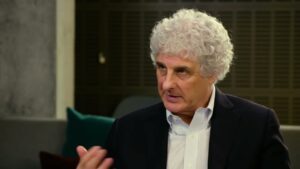
Types of Play & Why They Matter
An excerpt from a behind-the-scenes interview with Dr. Kathy Hirsh-Pasek at the 2018 Simms/Mann Institute Think Tank
Neuroscientists have found that music promotes brain development in early childhood, strengthening language and motor skills, as well as the capacity to regulate emotions and relate to others.
Music solidifies the brain-body connection. Before babies are verbal, they can demonstrate response to music through movement. The neural pathways that are fortified when an infant listens to music increase the child’s capacity for attention.
Live music, as a shared experience between child and caregiver, is a multisensory activity that promotes bonding and healthy attachment.
Research demonstrates that lullabies (soft, quiet, and soothing music) have a calming effect not only on the young child, but also on the caregiver singing them. Lullabies can help a child establish better sleep patterns.
Music can also help children dial down, preparing them for transitions such as temporary separation from their caregiver, naps, and perhaps most commonly, bedtime.
Louder music and use of instruments can help children dial up, giving them confidence to try a new activity, while simultaneously increasing their sense of arousal and joy.

An excerpt from a behind-the-scenes interview with Dr. Kathy Hirsh-Pasek at the 2018 Simms/Mann Institute Think Tank

An excerpt from the behind-the-scenes interview with Andrew Meltzoff, PhD at the 2018 Simms/Mann Think Tank

Excerpt from behind-the-scenes interview with Dr. Pat Kuhl at the 2018 Simms/Mann Institute Think Tank

As parents, we get so much feedback about what we can do to enhance our baby’s development. Sometimes, it can be difficult to remember one

Children thrive when they are provided with a predictable, structured environment. Routines provide a sense of safety and security, as well as foster healthy emotional and

Just think of how much time babies spend in routines of one kind or another: sleeping, bathing, feeding, and diaper changing, not to mention dressing,

An excerpt from a behind-the-scenes interview with Dr. Kathy Hirsh-Pasek at the 2018 Simms/Mann Institute Think Tank

As parents, we get so much feedback about what we can do to enhance our baby’s development. Sometimes, it can be difficult to remember one
| Cookie | Duración | Descripción |
|---|---|---|
| __stripe_mid | 1 year | Stripe sets this cookie cookie to process payments. |
| __stripe_sid | 30 minutes | Stripe sets this cookie cookie to process payments. |
| cookielawinfo-checkbox-advertisement | 1 year | Set by the GDPR Cookie Consent plugin, this cookie is used to record the user consent for the cookies in the "Advertisement" category . |
| cookielawinfo-checkbox-analytics | 11 months | This cookie is set by GDPR Cookie Consent plugin. The cookie is used to store the user consent for the cookies in the category "Analytics". |
| cookielawinfo-checkbox-functional | 11 months | The cookie is set by GDPR cookie consent to record the user consent for the cookies in the category "Functional". |
| cookielawinfo-checkbox-necessary | 11 months | This cookie is set by GDPR Cookie Consent plugin. The cookies is used to store the user consent for the cookies in the category "Necessary". |
| cookielawinfo-checkbox-others | 11 months | This cookie is set by GDPR Cookie Consent plugin. The cookie is used to store the user consent for the cookies in the category "Other. |
| cookielawinfo-checkbox-performance | 11 months | This cookie is set by GDPR Cookie Consent plugin. The cookie is used to store the user consent for the cookies in the category "Performance". |
| CookieLawInfoConsent | 1 year | Records the default button state of the corresponding category & the status of CCPA. It works only in coordination with the primary cookie. |
| elementor | never | This cookie is used by the website's WordPress theme. It allows the website owner to implement or change the website's content in real-time. |
| viewed_cookie_policy | 11 months | The cookie is set by the GDPR Cookie Consent plugin and is used to store whether or not user has consented to the use of cookies. It does not store any personal data. |
| Cookie | Duración | Descripción |
|---|---|---|
| mailchimp_landing_site | 1 month | The cookie is set by MailChimp to record which page the user first visited. |
| Cookie | Duración | Descripción |
|---|---|---|
| _ga | 2 years | The _ga cookie, installed by Google Analytics, calculates visitor, session and campaign data and also keeps track of site usage for the site's analytics report. The cookie stores information anonymously and assigns a randomly generated number to recognize unique visitors. |
| _gat_gtag_UA_46801669_2 | 1 minute | Set by Google to distinguish users. |
| _gid | 1 day | Installed by Google Analytics, _gid cookie stores information on how visitors use a website, while also creating an analytics report of the website's performance. Some of the data that are collected include the number of visitors, their source, and the pages they visit anonymously. |
| tk_lr | 1 year | The tk_lr is a referral cookie set by the JetPack plugin on sites using WooCommerce, which analyzes referrer behaviour for Jetpack. |
| tk_or | 5 years | The tk_or is a referral cookie set by the JetPack plugin on sites using WooCommerce, which analyzes referrer behaviour for Jetpack. |
| tk_r3d | 3 days | JetPack installs this cookie to collect internal metrics for user activity and in turn improve user experience. |
| tk_tc | session | JetPack sets this cookie to record details on how user's use the website. |
| Cookie | Duración | Descripción |
|---|---|---|
| cookies.js | session | No description available. |
| m | 2 years | No description available. |